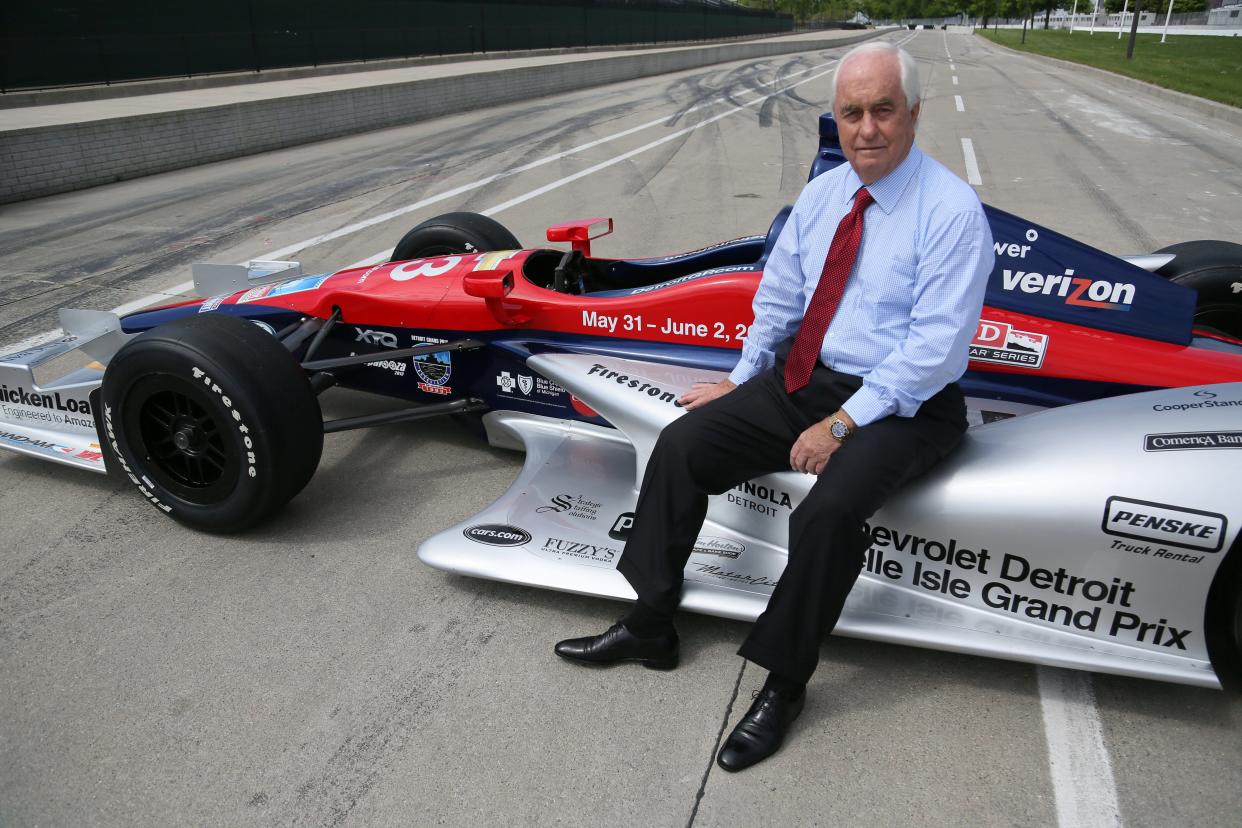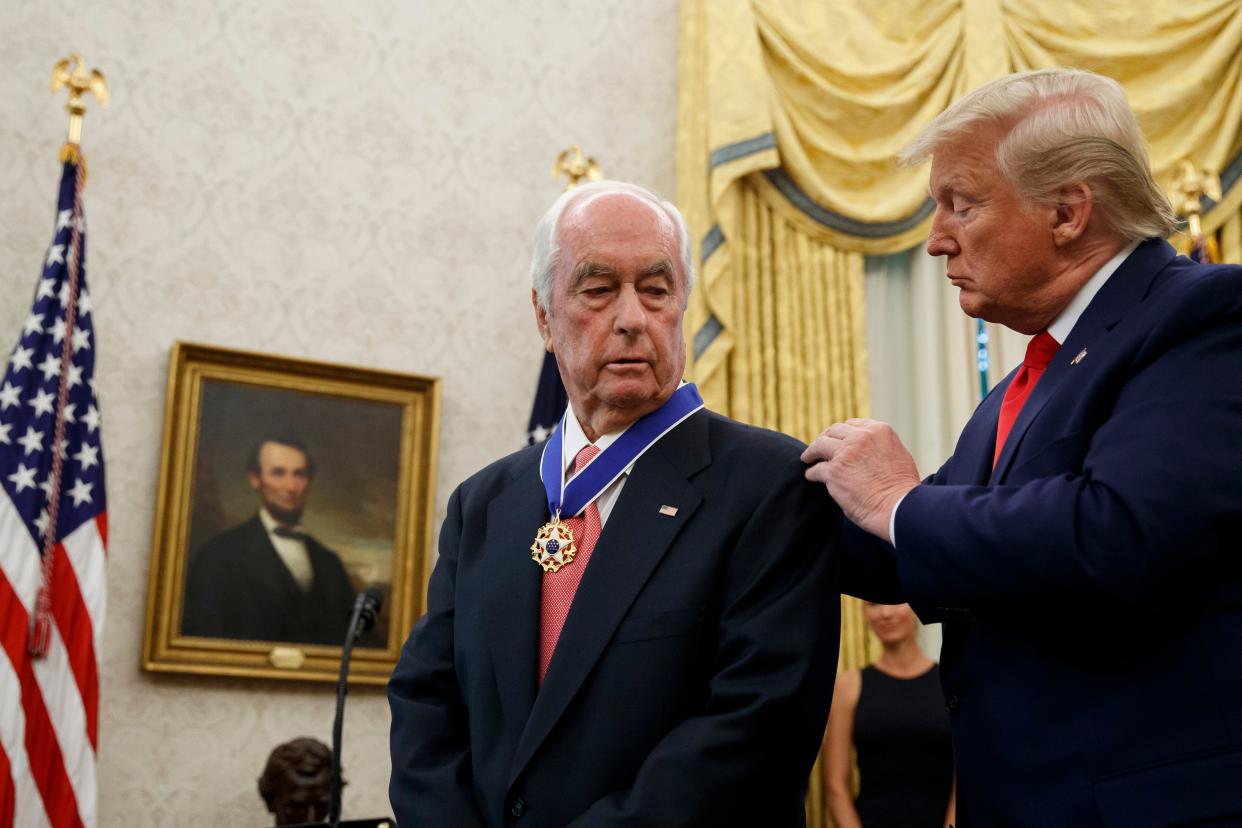Lawsuit: Company's board was too deferential to Roger Penske, blew $1B on stock buybacks
Bloomfield Hills-based Penske Automotive Group is facing a shareholder lawsuit over a claim that its board blew $1 billion on stock buybacks that gave Roger Penske sole majority control over the company, without having to spend money of his own.
The lawsuit argues that the board members, including prominent metro Detroit banking executive and Michigan State University trustee Sandy Pierce, were too deferential to Chairman and CEO Roger Penske in allowing him to gain control last year and not demanding that he pay a premium — as someone from outside the company would have likely had to do.
The board members acted in bad faith and failed in their fiduciary duties, according to the lawsuit, which was filed this week in Delaware Chancery Court and seeks class action status for all shareholders.

The lawsuit, brought by an individual shareholder, also seeks an unspecified amount of damages as well as assurances the board will adopt reforms to prevent a reccurrence.
"The Board knowingly permitted Roger to use the company’s cash to give himself sole voting control ... for no discernible reason other than handing Roger sole majority voting control," the lawsuit says.
A representative for Penske Automotive and Roger Penske said they don't comment on open litigation.
Penske Automotive Group is a publicly traded company that operates multiple-franchise auto and truck dealerships in mostly the U.S. and Europe and had nearly $28 billion in revenue in 2022 and over 26,500 employees.
It is one of several affiliates of the closely held Penske Corp., which Roger Penske started in 1969 for his various interests in the automotive world. The corporation's other affiliates include Penske Truck Leasing, Penske Logistics, Penske Motor Group, Penske Entertainment, Team Penske and the Detroit Grand Prix.
Roger Penske, 86, did not start Penske Automotive Group. Rather, the company was formed in 1990 by businessman and financier Marshall Cogan under the original name United Auto Group, and went public six years later.

Roger Penske in 1999 acquired a controlling stake in the company, and in 2007 it was renamed Penske Automotive Group. The company's board of directors has 13 members, including Chairman and CEO Roger Penske and one of his sons, Greg Penske.
Flush with earnings from a post-COVID-19 lockdown surge in vehicle demand, the company in 2021 began a series of stock buybacks that eventually came to total $1.1 billion last year, according to the publicly available version of the lawsuit, which has significant redactions.
Stock buybacks raise the value of current stockholders' shares and, typically, the company's stock price.
When the buybacks began, Roger Penske's shares gave him 43.7% voting power, the lawsuit says.
The buybacks gradually increased the power of Roger Penske's shares, because the company's outstanding shares were split amongst fewer people. By July 2023, his voting power was up to 52.2%, the lawsuit says, even though Penske "has not spent a dime on additional stock to become the company’s controller."
"It’s arithmetic," said Erik Gordon, a professor at the University of Michigan's Ross School of Business who isn't involved in the lawsuit.
"If there are 100 shares of a company outstanding and a big guy owns 40 of those shares and other people own 60 of the shares, if the company buys back 30 shares that aren’t his shares — if they buy back shares from other people — now there are only 70 shares outstanding, and he owns 40 of them," Gordon said.
According to the lawsuit's calculations, if not for the board's decision to do the buybacks, Roger Penske would have needed to buy $450 million worth of shares in 2021 to gain voting majority power.
The lawsuit says board members could have instead put the company's windfall toward returning cash to shareholders via a special dividend, or perhaps done an acquisition. But the board opted for the buybacks, thereby deciding "to allocate the cash in a way that maximized the benefits to Roger," the lawsuit claims.
Professor Gordon said corporate boards typically require outsiders to pay a premium to gain control over a company.
For example, if a company's shares are trading at $20 and someone wants to buy the company, they might offer the board $24 per share, a sum reflecting a premium to gain control.
The lawsuit claims that board members failed to protect shareholders and the value of the company by not getting a premium from Roger Penske.
"So their beef is, well, if somebody else came around — not Penske — if 'Smith' came around and wanted to get control of (the company), all of the shareholders would have got more money. They would have paid us a control premium. Penske is an insider — he got control without paying a control premium — that’s what irritating them,” Gordon said.
The lawsuit also names all of the board members as defendants, and claims that Roger Penske has long had a tight grip on the company and the board through employment, business and personal relationships.
One twist to the composition of the board is that Penske Automotive isn't legally required to have a majority of its board members be considered "independent," meaning not tied to the company through employment, family or significant business or charity interests.
That is because Penske Automotive is considered a "controlled company," with over 50% of the voting power for electing board members tied to an agreement between the privately held firms that own Roger Penske's stock and a Japanese industrial conglomerate Mitsui & Co.
Under the agreement, which expires in 2030, the Penske firms agree to vote for two Mitsui representatives to sit on the company's board if Mitsui owns over 20% of company stock, or only one Mitsui rep if the Japanese firm has 10% or more.
In exchange, Mitsui agrees to vote for up to 14 board members that Penske's firms support.
Mitsui held just over 19% of Penske Automotive stock as of last March, according to Securities and Exchange Commission filings. There is one Mitsui rep on the board.
The shareholder lawsuit disputes the company's assertion that the seven board members it deems "independent" are truly so.
The lawsuit doesn't get into what compensation board members earn by sitting on the board. Such compensation is standard among publicly traded companies.
Penske Automotive's SEC filings show that most of the non-employee board members received total compensation between $330,000 and $417,000 in 2022, coming in the form of stock awards, cash and various perks.

Among those board members — and named defendants in the lawsuit — is Sandy Pierce, one of the most prominent female executives in the metro Detroit business community.
Now in her mid-60s, Pierce was until this month a senior executive vice president at Huntington Bank and chair of the Ohio-based bank's Michigan operations. She also is chair of the Detroit Economic Club and was appointed in 2022 by Gov. Gretchen Whitmer to a six-year term on the MSU Board of Trustees
Pierce, who did not respond to an email seeking comment, is one of the six board members the company identifies as not independent, meaning there are some business or personal ties.
Penske Automotive disclosed in its latest annual filing that Huntington Bank purchased $59.2 million in automotive contracts from the company in 2022, representing 1,906 vehicles.
For Pierce's board activities in 2022, she received $394,000 in total compensation, according to SEC filings.
That broke down as $250,000 in stock awards, $60,000 in cash and about $84,000 in "other" compensation, which included $50,000 in charity match contributions and $34,000 in expenses for use of a company vehicle and spousal travel.
Pierce in December sold $1.3 million worth of Penske Automotive stock, according to SEC filings.
The shareholder plaintiff is being represented by law firms in New York and Delaware.
"We have laid out compelling facts which we believe plead a strong claim for breach of fiduciary duty," the Delaware law firm, Ashby and Geddes, said in a statement Friday. "It cannot be the case that you become the sole majority stockholder at the company’s expense.”
Who is on Penske Automotive Group's board
Roger Penske
John Barr, a former CEO of Valvoline. (Identified as an "Independent" board member.)
Lisa Davis, former CEO of Siemens Corp., USA ("Independent" member.)
Wolfgang Dürheimer, former CEO of Bentley Motors ("Independent" member.)
Michael Eisenson, a founder of investment firms. Also is a director of Penske Corp.
Robert Kurnick Jr., president of Penske Automotive Group.
Kimberly McWaters, former CEO of Universal Technical Institute, a provider of transportation industry technician training. ("Independent" member.)
Kota Odagiri, an executive at Mitsui.
Greg Penske, son of Roger Penske and CEO of Penske Motor Group.
Sandy Pierce, former executive at Huntington Bank, chair of the Detroit Economic Club and MSU trustee.
Greg Smith, retired vice chairman of Ford Motor Co. ("Independent" member.)
Ronald Steinhart, a retired banking executive. ("Independent" member.)
H. Brian Thompson, CEO of a private equity investment and advisory firm. ("Independent" member.)
Contact JC Reindl: 313-222-6631 or jcreindl@freepress.com. Follow him on X @jcreindl.
This article originally appeared on Detroit Free Press: Lawsuit: Company's board too deferential to Roger Penske, blew $1B
